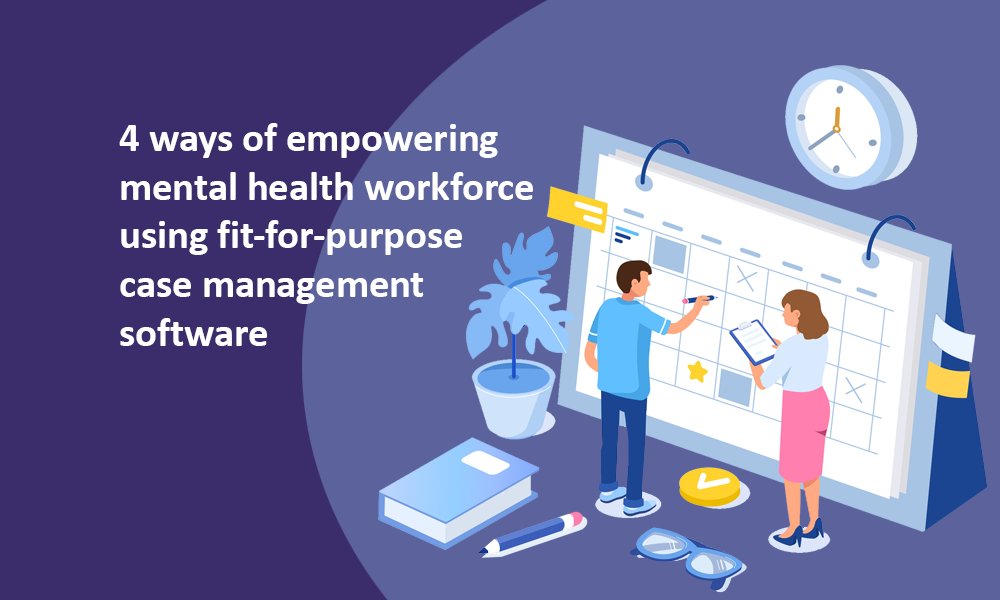Things have changed. Mental health service providers are expected to constantly improve consumer outcomes, ensure compliance while maintaining cost effectiveness.
These challenges require solutions that are adaptable, a technology platform that is responsive to changing business dynamics. Treatment and care in mental health are based on a multidisciplinary team approach. Teams normally include mental health nurses/registered nurses, social workers, clinical psychologists, occupational therapists, psychiatric registrars/medical officers and consultant psychiatrists. One of the key roles of technology today is to bring care team together into a single digital workspace so that they can deliver coordinated care at scale – it is more than a traditional electronic medical record.
Data-driven mental health outcome measures

An outcome measure in mental health measures the effect on a person’s mental health as a result of health care intervention, plus any additional extra-therapeutic influences. To be useful, mental health outcome measures must be valid and reliable, sensitive to change, comparable across relevant client groups and service types, and meaningful to both clients and clinicians. Paper-based outcome measures create blind spots in decision-making. How are you capturing and measuring outcomes today?
Telehealth

Telehealth allows mental health clinicians to reach consumers, rather than doing what has always been done. The use of telehealth truly supports the ability to integrate care and support the holistic management of a patient’s needs such as early intervention, follow-up care and peer support.
The integration of telehealth provides lots of opportunities to provide and enhance service delivery. This in turn provides greater choice, opportunity, diversity and flexibility that can be very attractive to prospective employees and enhance retention of the existing workforce
This reduces travel time in a great deal of the clinicians which can be used on another patient. On the other hand, patients who are concern about the stigma attached to mental health can be ensured of their privacy. Having a virtual workforce provides opportunities to maintain continuity of services.
Scheduling and service activity reporting
Mental health services delivered in hospitals and in the community are funded via state government or funding schemes like Victorian Alcohol and Drug Collection (VADC) / NDIS. It important to ensure the service activities can be counted and costed accordingly. It is starts with scheduling and reporting of service activities.

Co-ordinated care through case management require mental health services to integrate activities with other related service sectors such as acute health, disability services, drug and alcohol services, child protection, juvenile justice and primary mental health and aged care services. This require smart planning, resource management and scheduling capabilities.
Modern case management software scheduling features comes with a myriad of functions to help you streamline your appointment management process. The system will take care of individual appointments, group appointments and telehealth appointments, and multi-staff appointments. It will also enable you to filter and view the calendar by service type, room, staff member, and location thus reducing double bookings.
The system also will allow you to notify patients regarding appointments effectively and track the attendance of individual patients and groups from one place.
Single electronic medical record across acute and community care settings
Mental health clinical workflow consists of number of clinical documentation requirements. The information required is determined by the clinician/s and is reflective of clinical standards, local guidelines and policies. The Mental Health Act requires that each patient have Assessment, treatment planning, implementation. Outcomes measures, Monitoring and discharge planning documents in the patient’s medical record, regardless of the modality of care
Mental health clinicians have a lot on their plate dealing with patients alone. However, patients are only a fraction of the work they have to handle being a mental health professional. From handling appointments, clinical documents to organizing patient notes, the workload is massive not to be able to handle without burnouts.
Complete case management software can help clinical documentation fast, simple, easy and accessible. It helps create, collect, manage, organize and analyze information of their patients. The solution is known for streamlining processes and speeding up operations through automation and digitalizing health records and data.

With complete case management software, clinicians will be able to store all the documents from contact information, diagnosis, treatment and client history of individual patients in one centralized hub. Therefore, they will be able to access any information then and there with a click of a button. As the system offers you real-time updates, you will be able to view any documents immediately, in the next moment they’ve entered to the system.
Secure exchange of timely clinical information is essential for continuity of care provision.
Technology today enable secure exchange of clinical information between care transitions using secure messaging or secure email features. This eliminate the need of time consuming printing, filing and fax based manual tasks.
There is no question that the barriers to strengthening mental health workforce capacity and improving service delivery will not be easily overcome. However fit-for-purpose digital technology solution to empower clinicians means they can focus more on consumers and carers over manual and paper based administrative tasks. With our fit-for-purpose technology allowing mental health workforce to better connect and engage with consumers and carers, we’re proud to stand up and be counted on #MentalHealthWeek, 2020
#healthcareleaders #HIT #public #healthsystems



